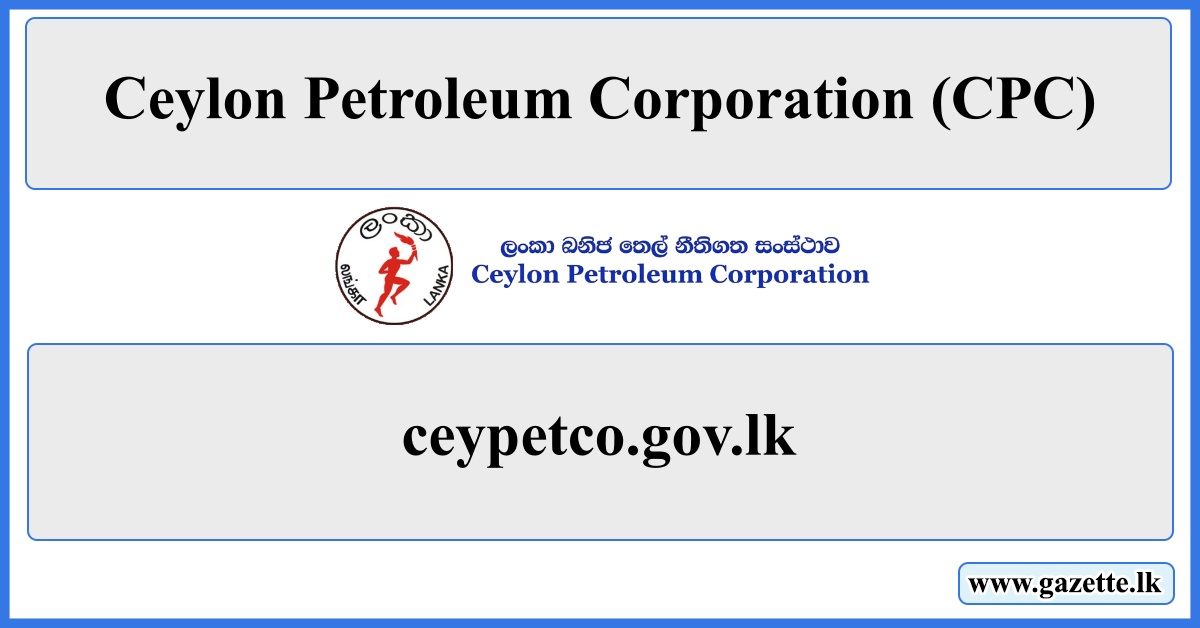The Ceylon Petroleum Corporation (CPC) is the government owned company which is very instrumental in the supply of fuel and energy needs of Sri Lanka. In over 50 years of its existence, since its inception in 1961, CPC has been the blood of the petroleum sector in the country, since it has helped the nation maintain consistent supply of petroleum products to keep the transport sector, the industrial sector, the power sector, and even households bcaring. Whether it is the importation of fuel or the running of storage terminals and the distribution of the petroleum products across the island, CPC is incapable of being a missing arm to the economic apparatus of Sri Lanka.
Ceylon Petroleum Corporation (CPC)
CPC was setup by the Ceylon Petroleum Corporation Act No. 28 of 1961 to take over the work of foreign oil companies and integrate petroleum industry under national control. The corporation is a distributor and refiner that mobilizes various products in Sri Lanka including petrol, diesel, kerosene, aviation fuel, lubricants, etc.
It functions via a broad system of fuel stations, storage terminals, bulk distribution systems, as well as the Sapugaskanda Oil Refinery, which happens to be the sole oil refinery in the country.
Interested in contributing to these duties? Explore the current Ceylon Petroleum Corporation (CPC) Vacancies and start your career today.
Overview and Contact Information
| Established | 1961 |
| Headquarters | Colombo |
| Address | No.609, Dr. Danister de Silva Mawatha, Colombo 09. |
| Telephone | +94 117 296 100 |
| secratariat[at]ceypetco.gov.lk |
|
| Website | ceypetco.gov.lk |
| www.facebook.com/ceypetco | |
| Youtube | www.youtube.com/@ceylonpetroleumcorporation |
| www.linkedin.com | |
| Important Links | |
| Tender | Click Here |
Office hours: Monday to Friday, 8:30 AM – 4:15 PM
Ceylon Petroleum Corporation Registration Forms
| Registration for Tenders – Application Form | Download PDF |
| Registration for Tenders – Approval Process | Download PDF |
| Registration for Tenders – Guidelines | Download PDF |
| Registration for Tenders – Terms & Conditions | Download PDF |
| Registration of Contractors for 2025/2026 – English | Download PDF |
| Registration of Contractors for 2025/2026 – Sinhala | Download PDF |
| Registration of Contractors for 2025/2026 – Application Form | Download PDF |
| Registration of Foreign Suppliers and Their Local Accredited Agents- 2024/2025 | Download PDF |
| Registration of Local Suppliers – 2025 | Download PDF |
| Registration of Suppliers for the supply of Crude Oil, Refined Petroleum Products and Agrochemicals | Download PDF |
| Application for Registration of Suppliers | Download PDF |
| Import of Petroleum Products to Sri Lanka Through Tender | Download PDF |
Responsibilities of CPC
Ceylon Petroleum Corporation is responsible for:
- Importing crude oil and refined petroleum products
- Refining crude oil at Sapugaskanda Refinery
- Distribution of petroleum products across the island
- Maintaining the national fuel reserves
- Managing fuel quality standards
- Supplying aviation fuel to airports and bunkering for ships
- Participating in national energy security policy development
- Issuing tenders for supply, transport, and infrastructure
These activities ensure the uninterrupted availability of energy to fuel Sri Lanka’s economy and public life.
Ceylon Petroleum Corporation Fuel Prices
Fuel prices in Sri Lanka are subject to global market fluctuations, exchange rates, and government tax policies. CPC publishes updated fuel prices periodically. As of the latest update: (2025 June)
| Fuel Type | Price (LKR) |
|---|---|
| Petrol 92 Octane | Rs. 373/L |
| Petrol 95 Octane | Rs. 458/L |
| Auto Diesel | Rs. 358/L |
| Super Diesel | Rs. 427/L |
| Kerosene | Rs. 255/L |
Prices can change depending on the revised rates by the government and changes of the oil markets worldwide. Please use the official CPC site if you wish to have up to date information.
Sri Lanka Historical fuel prices
Inflation, transport costs, and economic stability will be analyzed on the basis of understanding the trend in fuel prices. CPC has kept the history of how the prices of crude oil in world markets, refining petroleum prices and the finance policies of the local governments have affected the prices of fuels in Sri Lanka in the olden times. Among the changes it included:
- Big jumps with the world oil crises (1970s and 2000s)
- Subsidies in downturns of economy
- Sharp adjustments during the 2022 fuel crisis
CPC’s fuel price archive provides insights into these fluctuations.
E-Services Provided by CPC
The Ceylon Petroleum Corporation is gradually adopting digital transformation. Some of the available and proposed e-services include:
- Online Public Tender Portal: For bid announcements and tender submissions
- Fuel Price Updates: Regular digital updates via the website and SMS
- Online Job Applications: Career portal for job seekers
- E-payment support (for select filling stations through mobile apps and cards)
- Fuel Management Systems for government and large-scale corporate fuel users
Digital services are being expanded to promote transparency, ease of access, and customer satisfaction.
Public Tenders by CPC
CPC frequently calls for public tenders related to:
- Crude oil and refined product procurement
- Pipeline construction and maintenance
- Fuel tankers and logistics services
- Supply of chemicals, spare parts, lubricants
- Construction and infrastructure projects
These tenders will be made open on the formal CPC tender portal and the local newspapers providing free competition and openness. All tenders consist of eligibility requirements, specification of technical requirements and procedures to be followed in submitting tenders.
Ceylon Petroleum Corporation Director Board
Rules of the CPC are run by a Board of Directors selected by the Ministry of Power and Energy. The Board is involved in strategic decision making, adhering to government policy and in financial management.
As of 2025, the board typically includes:
- Chairman (appointed by the Minister)
- Managing Director/CEO
- Representatives from the Treasury, Central Bank, Ministry of Energy
- Independent technical experts
***Leadership and policy direction from the board help maintain CPC’s integrity and operational effectiveness.
CPC’s Role in National Energy Security
CPC is not just a supplier of fuel — it plays a strategic role in Sri Lanka’s national energy policy. The corporation is involved in:
- Expanding storage capacity for fuel reserves
- Promoting renewable energy integration
- Compl inspection of low-sulfur fuel to preserve the environment
- Working along with foreign entities to diversify energy sources
- Creation of infrastructural projects such as pipeline and terminals
By having these initiatives, CPC has a role in the long term energy sustainability.
Questions commonly inquired (FAQs)
1. Is the Ceylon Petroleum Corporation the sole fuel provider in Sri Lankan?
No. Although both CPC and Lanka IOC are the primary competitors in petroleum industry in Sri Lanka, the two companies are different because CPC is the largest publicly-owned petroleum company whereas Lanka IOC is the primary privately-owned petroleum company.
2. Do people submit the fuel station applications via CPC?
Well, sometimes, CPC removes some adverts seeking new fuel stations dealership.
3. What are the ways of complaining against a fuel station?
You may appeal against the CPC hotline or leave complaints within e-mail to info@ceypetco.gov.lk or consumer affairs Division.
4. Do the prices of CPC fuel remain steady?
The government has a fuel pricing formula that reviews and sets prices monthly based on global oil prices, taxes, among other economic indices.
5. How does CPC work when there is fuel shortage?
CPC has the obligation of controlling fuel reserves and facilitating with foreign producers to stabilize the domestic market.
Conclusion
Ceylon Petroleum Corporation is not simply a distributor of fuels, but it is rather a nation-bearing pillar that props transport, agriculture, industry as well as national defense. CPC is one of the most strategically significant state-owned enterprises since its performance directly influences the daily life in Sri Lanka.
Owing to the development of global energy markets, CPC has new challenges and prospects particularly in such spheres as green energy, modernization of refinery and public-private partnership. Transparent, technological advancement, enhanced governance, are CPC opening the door to a more secure and green energy future of Sri Lanka.


